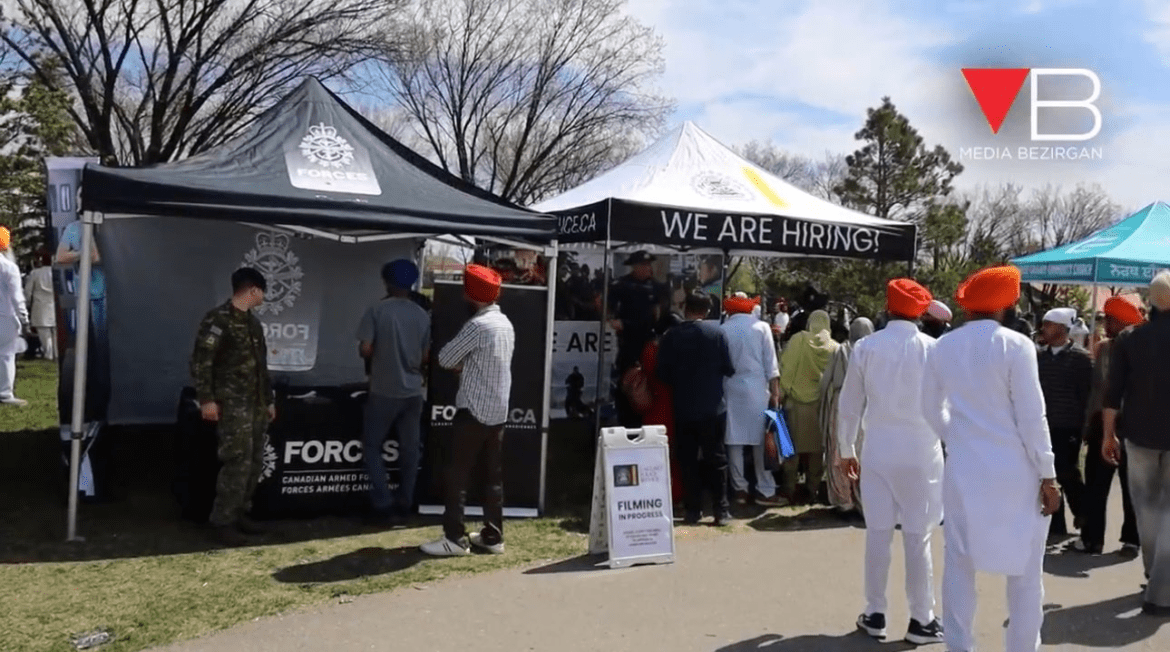AI Generated Summary
- The presence of the Canadian Armed Forces at a Khalistan event glorifying Talwinder Singh Parmar is a concerning development that warrants urgent attention.
- It appears to be a desperate measure by an administration that is failing to address the root causes of the military’s challenges.
- The administration needs to clarify its position on extremism and ensure that all branches of the government, including the military, adhere to a zero-tolerance policy towards extremist ideologies.
A recent tweet by Harrison Faulkner, a journalist with True North News, Canada, has ignited a storm of controversy on social media. The tweet raises a critical question: “Why was the Canadian Armed Forces recruiting at a Khalistan event where the glorification of one of Canada’s worst terrorists, Talwinder Singh Parmar, was on display?” Parmar was the mastermind behind the Air India Kanishka bombing, the deadliest terrorist attack in Canadian history. This revelation has led to widespread concerns about the implications of such actions by the Canadian administration.
Why was the Canadian Armed Forces recruiting at a Khalistan event where the glorification of one of Canada’s worst terrorists Talwinder Singh Parmar was on display?
— Harrison Faulkner (@Harry__Faulkner) May 12, 2024
Parmar was the mastermind of the Air India bombing, the worst terrorist attack in Canadian history. pic.twitter.com/UCCrd7KOC7
The presence of the Canadian Armed Forces at an event celebrating Parmar is deeply troubling. It suggests a potential alignment or at least an alarming level of tolerance towards extremist ideologies. This is particularly disturbing given Parmar’s heinous legacy. The Air India bombing in 1985 resulted in the deaths of 329 people, most of whom were Canadian citizens. Any association with his legacy is an affront to the victims and their families.
This incident raises serious questions about the current administration’s stance on extremism. Is the government so desperate to bolster recruitment numbers that it is willing to engage with groups that have a history of violent extremism? If so, this represents a significant risk to national security. The potential for radicalization within the ranks of the military is a real and present danger. Allowing extremists to infiltrate the armed forces could undermine the integrity and operational effectiveness of the military, posing a direct threat to Canada’s safety and security.
True North News has highlighted a broader issue within the Canadian Armed Forces. The military, once a formidable force respected by allies and feared by enemies, is now grappling with a series of internal crises. The relentless push for diversity, equity, and inclusion (DEI) and the imposition of progressive ideologies have reportedly eroded morale and thinned out the leadership ranks. Chronic underfunding has exacerbated these problems, leading to an attrition crisis that has left the armed forces struggling to maintain its strength and readiness.
This context makes the decision to recruit at a Khalistan event even more perplexing. It appears to be a desperate measure by an administration that is failing to address the root causes of the military’s challenges. Instead of tackling underfunding and boosting morale through meaningful reforms, the government seems to be resorting to controversial and potentially dangerous recruitment strategies.
The implications of this approach are far-reaching. By engaging with extremist groups, the Canadian administration risks legitimizing their ideologies and providing them with a platform to spread their message. This could embolden other extremist factions and lead to an increase in radical activities within Canada. Furthermore, it sends a troubling signal to the international community about Canada’s stance on terrorism and extremism.
Prime Minister Justin Trudeau’s government must take immediate and decisive action to rectify this situation. The administration needs to clarify its position on extremism and ensure that all branches of the government, including the military, adhere to a zero-tolerance policy towards extremist ideologies. This includes reassessing recruitment strategies and ensuring that events associated with terrorism are unequivocally avoided.
In conclusion, the presence of the Canadian Armed Forces at a Khalistan event glorifying Talwinder Singh Parmar is a concerning development that warrants urgent attention. The current administration must demonstrate a clear and unwavering commitment to combating extremism and protecting national security. Anything less would not only dishonor the memory of the Air India bombing victims but also jeopardize the safety and security of all Canadians.
The opinions expressed in this article are those of the author. They do not purport to reflect the opinions or views of Khalsa Vox or its members.




